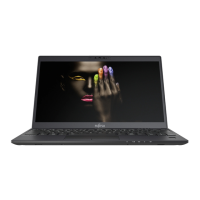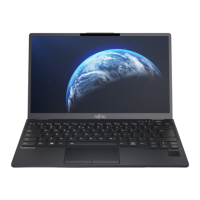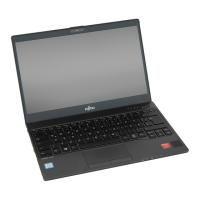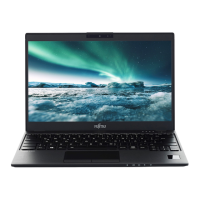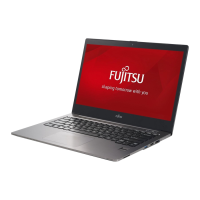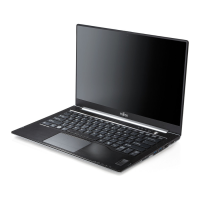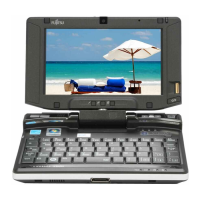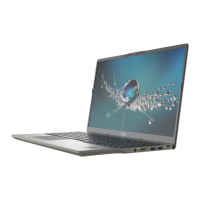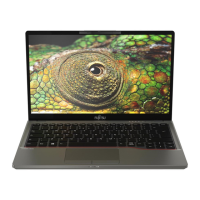Do you have a question about the Fujitsu LifeBook U9313X and is the answer not in the manual?
Information on drivers and software for the device.
Indicates risk to health, device damage, or data loss.
Indicates important information for proper device use.
Indicates an activity that must be performed.
Indicates data entered via keyboard in programs or command line.
Indicates information displayed by a program on screen.
Refers to terms and texts in software interfaces or file names.
Refers to other sections or external sources like web addresses.
Indicates a specific key on the keyboard.
Indicates terms and texts that are emphasized or highlighted.
Diagram and labels for components visible when the notebook is open.
Diagram and labels for ports on the left side of the device.
Diagram and labels for ports on the right side of the device.
Diagram and labels for ports on the bottom of the device.
Essential safety information for notebook operation, including warnings.
Safety precautions for using wireless components like Wi-Fi and Bluetooth.
Tips on reducing power consumption and extending battery life.
Guidance on using Windows power management features.
Advice on preparing for travel and using the notebook abroad.
Precautions to take when moving or carrying the notebook.
Instructions and warnings for cleaning the notebook's surfaces and screen.
Steps to take if the notebook gets wet.
Instructions for unpacking and inspecting the device for damage.
Guidelines for choosing a suitable and safe place to set up the notebook.
Steps for connecting the power adapter to the device and a power outlet.
Procedure for the initial power-on and software installation.
Explanation of various status lights on the notebook.
Detailed descriptions of what each status indicator means.
Instructions on how to open the notebook screen.
Steps to power on the notebook and what indicators to look for.
How to configure the behavior of the ON/OFF button.
Instructions on how to convert the notebook into a tablet form factor.
How to change screen orientation and manage display settings.
Instructions on how to convert the tablet back to a notebook form factor.
Steps for properly shutting down the notebook.
Instructions on how to close the notebook lid.
Information on supported languages and settings for handwriting input.
Information about the touchscreen, including care and resolution.
How to interact with the touchscreen using fingers or a stylus.
Procedure for calibrating the touchscreen for accurate input.
Guide on using the stylus pen for selection, navigation, and drawing.
How the pen is held in the slot and its charging mechanism.
How the pen conserves power when not in use.
How the pen's battery is charged automatically when inserted.
How to configure pen settings in Windows.
Procedure for calibrating the pen for accurate input.
Instructions for attaching a pen tether to prevent loss.
General instructions for using the device in notebook mode.
Information on using the touchpad for cursor control and selection.
How to drag and drop items using the touchpad.
How to enable or disable the touchpad.
Overview of the keyboard, its functions, and key markings.
Detailed explanation of individual keys like Backspace, Tab, Enter, etc.
Information on using the virtual numeric keypad and its settings.
How to change regional and keyboard layout settings.
Explanation of special functions assigned to F1-F9 keys.
Explanation of F10-F12 keys and other combinations.
How to toggle between hotkey and function key behavior for F keys.
How to control the keyboard backlight.
Information about the infrared and tablet mode cameras.
General information about the battery, its life, and care.
Procedure for temporarily disabling and re-enabling the battery.
How to use power saving modes to extend battery life.
How to manage performance settings for power and fan speed.
How to set the fan speed for performance or quiet operation.
Information on supported memory card formats and reader.
Details on the notebook's audio components and their functionality.
Information about using a SIM card for mobile network access.
Steps to safely remove the SIM card from its slot.
Information on wireless components and their installation restrictions.
How to enable or disable wireless connectivity.
How to connect to a wired network using the Ethernet port.
Introduction to the port replicator for connecting peripherals.
Diagram and list of ports available on the port replicator.
Explanation of the indicators on the port replicator.
Instructions for choosing a location and setting up the port replicator.
Steps to connect the power supply to the port replicator.
How to connect the notebook to the port replicator using a Thunderbolt cable.
How to power on the notebook using the port replicator's button.
Procedure for safely detaching the notebook from the port replicator.
Important reminders about passwords, backups, and security settings.
How to configure and use the fingerprint sensor for authentication.
How to set up and use the palm vein sensor for authentication.
Instructions on how to connect and use a Kensington lock cable.
How to set up BIOS passwords and their security levels.
Details on setting up supervisor and user passwords for BIOS access.
Step-by-step guide to setting BIOS supervisor and user passwords.
How to modify existing BIOS supervisor or user passwords.
Procedure for deleting BIOS supervisor or user passwords.
How to enable password protection for system startup.
How to set a password for the hard drive for data security.
Information about using SmartCards for authentication and security.
Steps for correctly inserting a SmartCard into the reader.
How to activate an on-screen keyboard for BitLocker password entry.
How to connect devices using the HDMI port.
Steps to connect an external display via the port replicator.
How to connect various USB devices to the notebook.
Details on using the USB-C port for charging and display output.
How to use USB ports for charging devices, even when the notebook is off.
Procedure for safely disconnecting USB devices to prevent data loss.
How to connect audio devices like headsets and speakers.
Warnings about unauthorized repairs and invalidating the warranty.
Steps to enter the BIOS Setup Utility from the operating system or boot menu.
How to navigate and make changes within the BIOS Setup interface.
Options for saving changes, discarding them, or loading defaults.
Function to securely delete data from hard drives or SSDs.
Options and procedures for the Erase Disk function.
Initial actions to take when a fault occurs, including contacting support.
How to perform a forced shutdown or system/battery reset.
Guidance on what information to have ready when contacting support.
Troubleshooting steps for incorrect system date and time settings.
Diagnosing issues with the battery charging indicator.
Troubleshooting when only numerals are typed or the screen remains blank.
Solutions for when the external monitor remains blank or the image is unstable.
Troubleshooting for cursor movement and pen input problems.
Solutions for when the notebook cannot be started or stops working.
How to troubleshoot problems with the wireless network connection.
Tips for preventing the battery from discharging too quickly.
Troubleshooting for unrecognized SmartCard readers or forgotten PINs.
What to do when the notebook emits acoustic warnings, e.g., low battery.
Explanations and resolutions for common BIOS error messages.
How to reset the system to its original state via Windows Recovery.
Details on processor, memory, touchscreen, and graphics card.
Physical dimensions, keyboard, touchpad, and pen specifications.
List of available ports and memory/SIM card slots.
Environmental operating conditions and USB port details.
Technical details for the optional port replicator.
Details on screen resolution compatibility for various display configurations.
Detailed specifications for the notebook's rechargeable battery.
Technical details for the notebook's USB Type-C power adapter.
Technical details for the port replicator's mains adapter.
Guidelines for battery disposal and recycling.
Information regarding TCO certification.
Compliance with Specific Absorption Rate limits.
Information on other relevant certification markings.
